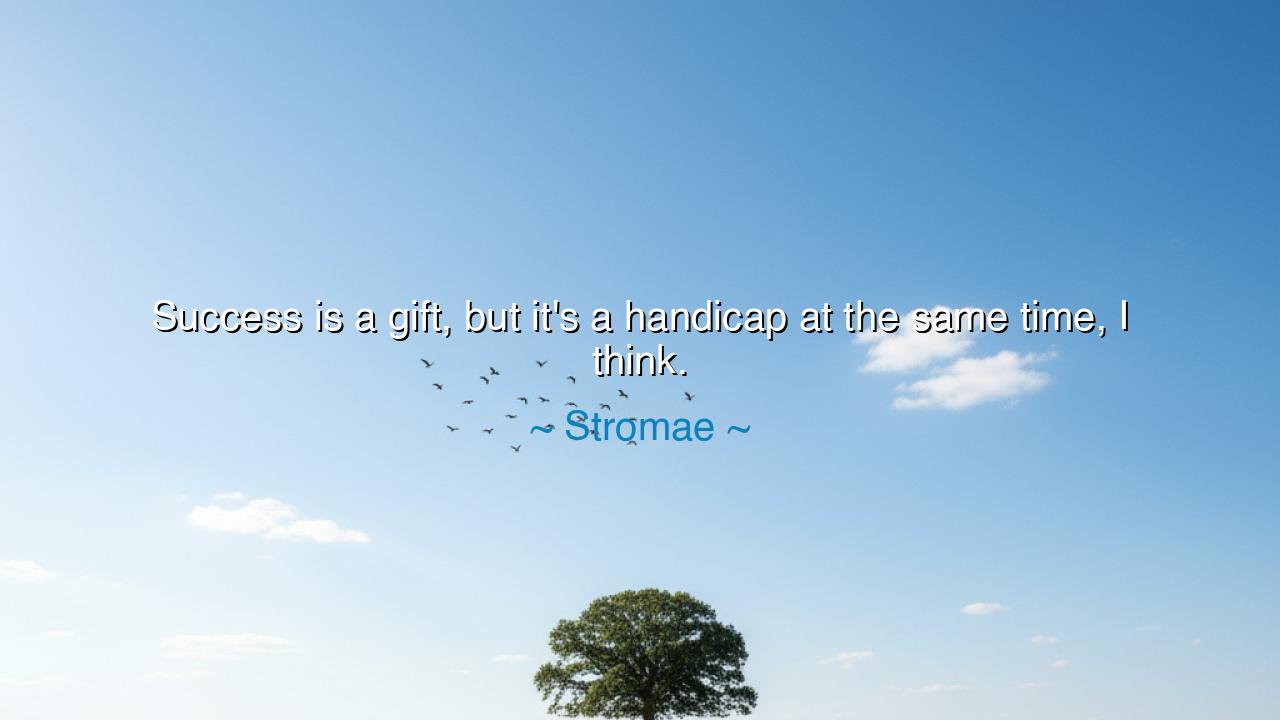
Success is a gift, but it's a handicap at the same time, I






When the Belgian artist Stromae declared, “Success is a gift, but it’s a handicap at the same time, I think,” he spoke with the voice of one who has tasted both the sweetness and the bitterness of triumph. For the world sees only the glory of success—the applause, the recognition, the crown of achievement—but within it lies also a hidden weight. Success is indeed a gift, for it grants influence, honor, and opportunity. Yet it is also a handicap, for it brings burdens, expectations, and the temptation to lose oneself amidst the noise of praise.
The ancients knew this paradox well. Consider the story of King Midas, who prayed that all he touched might turn to gold. The gods granted him this gift, but soon he found it also to be a curse. For his food turned to metal, his drink to treasure, and even his beloved daughter became a statue of lifeless gold. His success, his blessing, became his ruin. Stromae’s words echo this old wisdom: that what the world calls gift can also be a burden, and what appears as fortune may carry hidden sorrow.
History itself bears witness to this truth. Think of Alexander the Great, who conquered the known world before the age of thirty. His success was unmatched, yet it also robbed him of peace. Having reached the summit, he found nothing left to climb. His victories left him restless, burdened by the emptiness that sometimes follows the fulfillment of every desire. His gift of conquest became a handicap to his spirit, leaving him wandering, unsatisfied, until death claimed him in the bloom of youth.
In our own time, we may remember Kurt Cobain, the voice of a generation through his music with Nirvana. His success gave him fame beyond imagination, yet it also brought pressures, expectations, and inner torment he could not escape. What millions envied in him became the very weight that crushed his soul. Stromae, himself an artist who has walked through struggle and retreat, speaks not from theory but from experience: success can raise you up and, at the same time, strip you bare.
The meaning of the quote is this: every gift carries a shadow. Success gives power, but it also demands sacrifice. It opens doors, but it also closes others. It wins you the world’s attention, but sometimes at the cost of your own peace, privacy, or balance. To treat success as only a blessing is foolishness; to treat it as only a curse is despair. True wisdom lies in holding both truths together: to honor success as a gift, yet to guard oneself against its dangers.
The lesson for us is clear: when success comes, receive it with gratitude but walk with caution. Do not allow it to blind you, nor let it define you. Remember always who you were before the applause, and nurture that self. Keep friends who love you not for your victories but for your soul. Accept success as a tool, not as your master; let it serve your deeper purpose, rather than enslaving you to the expectations of others.
Practical wisdom follows. If success visits you, remain humble. Protect time for rest, reflection, and the quiet joys that fame cannot give. Share your gift generously, for the more you give, the less it consumes you. And if success has not yet come, prepare yourself—not only to seize its opportunities, but to bear its weight wisely. For the true challenge is not to achieve success, but to carry it without losing your soul.
Therefore, let us take Stromae’s words as both warning and encouragement. “Success is a gift, but it’s a handicap at the same time.” A gift, for it allows us to shine; a handicap, for it can also chain us in unseen ways. Let us strive not only for the crown, but for the wisdom to wear it lightly, so that our triumphs do not destroy us, but instead allow us to live with balance, purpose, and grace.






AAdministratorAdministrator
Welcome, honored guests. Please leave a comment, we will respond soon